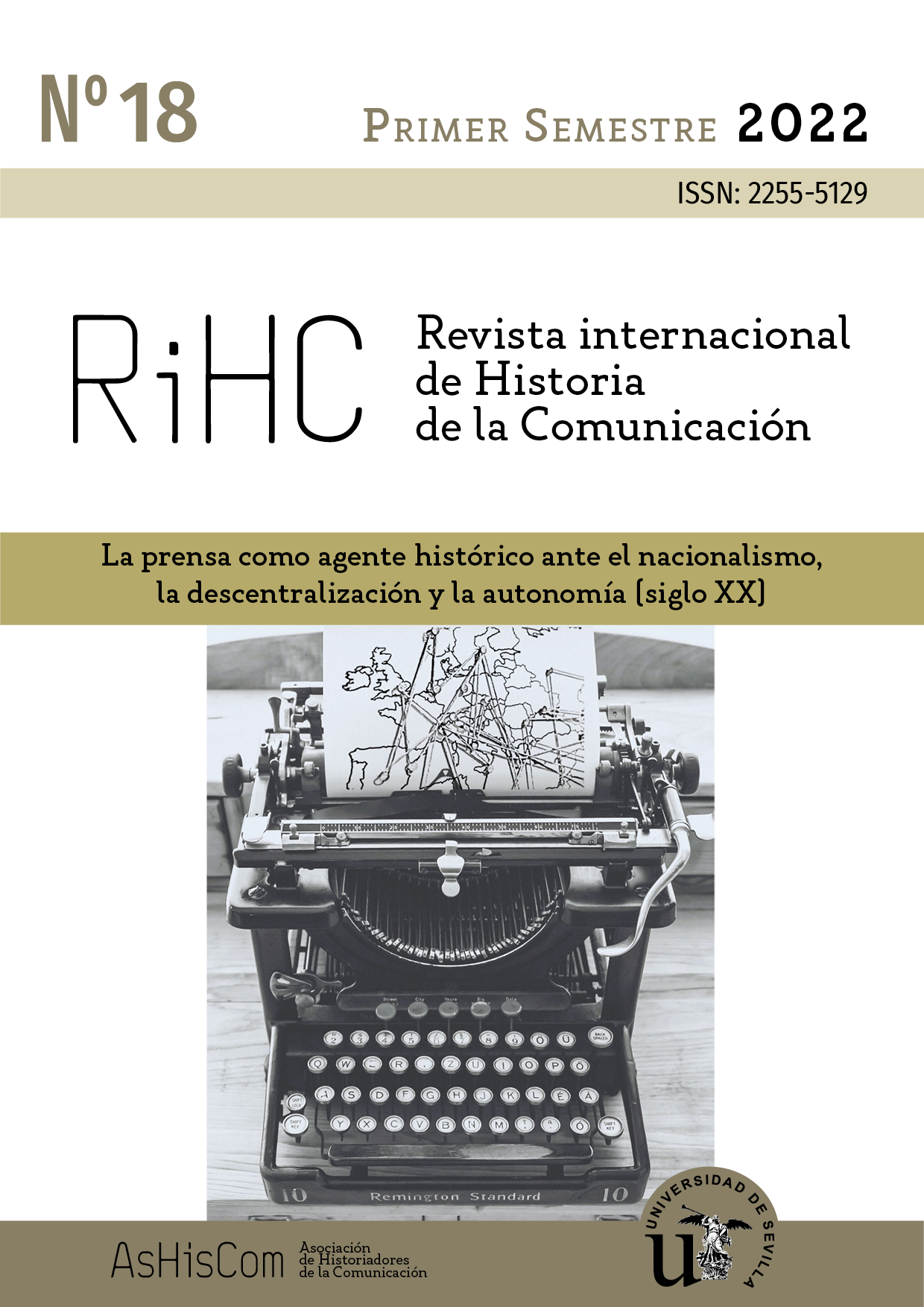Spanish biographical cinema (1900-1939): causes of its production and the work of the film press
DOI:
https://doi.org/10.12795/RiCH.2022.i18.10Keywords:
Film biography, Film Press, Primo de Rivera's Dictatorship, Second Republic, Spanish Civil WarAbstract
This article analyses Spanish film magazines and statements by intellectuals between 1900 and 1939, focusing the analysis on biographical cinema. This interest in biographical cinema is endorsed by its link to the political-cultural context, marked by regenerationism, the search for national identity and the gradual assumption of cinema as a pedagogical tool. Thus, the sources consulted reveal a growing demand for this type of film, of which less than twenty were made between the appearance of the cinematograph and Franco's regime. On the other hand, by analysing the films that were released, we also obtain the keys to the way in which a biographical film was conceived at that time, as well as understanding the reasons for the generalised dissatisfaction of the specialised critics. The unavoidable comparison with foreign cinematographies and the pressure to present the history of Spain in an honourable way weighed down the biographical cinema of the time.
Downloads
References
ÁVAREZ MACÍAS, N. (2002): “Cine y educación en la España de las primeras décadas del siglo XX. Tres concepciones del cine educativo”, Tarbiya: Revista de investigación e innovación educativa, 31, pp. 39-66
BALFOUR, S. (1997): El fin del Imperio español (1898-1923), Barcelona, Crítica
BENET, V.J. (2012): El cine español: una historia cultural, Barcelona, Paidós
CAMARERO GÓMEZ, G. (2009): Pintores en el cine, Madrid, Ediciones JC
CANO, L. (2009): «Reinaré en España»: La mentalidad católica a la llegada de la Segunda República, Madrid, Encuentro
CAPARRÓS LERA, J.M. (1977): El cine republicano español, Barcelona, Dopesa
― (1981): Arte y política en el cine de la República (1931-1939), Barcelona, Editorial 71/2
― (2007): Historia del cine español, Libro electrónico: T&B Editores.
CERDÁN, J. Y HEININK, J.B. (1999): “La Historia oblicua”, en Ficciones Históricas. El cine histórico español. Cuadernos de La Academia, 6, Madrid, Academia de las Artes y las Ciencias Cinematográficas de España, pp. 43-52
COSTA, J. (1980): Crisis política de España, Barcelona, Producciones Editoriales
CRESPO, L. (2012): El espíritu del regeneracionismo, Madrid, Accenture
GARCÍA CARRIÓN, M. (2013): Por un cine patrio: Cultura cinematográfica y nacionalismo español, 1926-1936, Valencia, Universidad de Valencia
GUBERN, R. (1977), El cine sonoro en la II República (1929-1936), Barcelona, Lumen
― (2010), “El cine sonoro (1930-1939)”, en Gubern, R. (coord.), Historia del cine español, Madrid, Cátedra, pp. 123-179
HEININK, J.B. (1998): “Estado de alarma: el cine español de la II República durante el mandato del Frente Popular”, en Cuadernos de la Academia, 2, Madrid: Academia de las Artes y las Ciencias Cinematográficas de España, pp. 133-144
― (2001), “Cronología del cine español”
HEININK, J.B. Y VALLEJO, A.C. (2009) Catálogo del cine español (1931-1940), Madrid, Filmoteca Española
IBARS FERNÁNDEZ, R. Y LÓPEZ SORIANO, I., (2006): “La Historia y el cine”, Clio, 32
MARÍAS, J. (1994): El cine de Julián Marías. Vol I., Barcelona, Royal Books S. L.
MARTIALAY, F. (2017), El cine español durante el franquismo, Oviedo, El Sastre de los Libros
MARTÍNEZ ÁLVAREZ, J. (2009): “Del rojo al azul: las pantallas de las dos Españas”, Espacio, Tiempo y Forma. Serie V, Historia Contemporánea, 21, pp. 117-139
MEDRANO COLL, F. J. (2018): Celuloide ingenuo. El cine español durante la dictadura de Primo de Rivera, Canterano (Roma), Aracne Editrice
MONTERDE, J.E. (2010): “El cine de la autarquía (1939-1950)”, en Gubern, R. (coord.), Historia del cine español, Madrid, Cátedra, pp. 181-238
NIETO FERRANDO, J. (2009): Cine en papel: cultura y crítica cinematográfica en España, 1939-1962, Valencia, Generalitat Valenciana
PÉREZ BASTÍAS, L. Y ALONSO BARAHONA, F. (1995): Las mentiras sobre el cine español, Barcelona, Royal Books
POZO ANDRÉS, M. M. del (2007): “Los educadores ante el problema de España”, en Salavert, V. y Súarez Cortina, M. (coords.), El regeneracionismo en España. Política, educación, ciencia y sociedad, Valencia, Universidad de Valencia
SÁNCHEZ NORIEGA, J.L. (2004): “Momentos significativos del cine histórico español”, en Apuntes sobre las relaciones entre el cine y la historia (el caso español), Salamanca, Junta de Castilla y León
TORRES HORTELANO, L. J. (ed.) (2012): Directory of World Cinema: Spain, Bristol, United Kingdom: Intellect Books
UTRERA, R. (1981): Modernismo y 98 frente a cinematógrafo, Sevilla, Universidad de Sevilla
VIEIRA, P. (2013): Portuguese Film, 1930-1960: The staging of the new state regime, New York, London, Bloomsbury Academic
VIUDES, A. (2017): Bandolerismo. De la imagen al mito, Tesis Doctoral, Universidad Miguel Hernández, Elche (Alicante)
Downloads
Published
How to Cite
Issue
Section
License
Copyright (c) 2022 RIHC. Revista Internacional de Historia de la Comunicación

This work is licensed under a Creative Commons Attribution-NonCommercial-ShareAlike 4.0 International License.
RiHC. Revista internacional de Historia de la Comunicación is an open access publication, offering its content under the principle that making research available to the public free of charge contributes to the greater exchange of global knowledge.
RiHC. Revista internacional de Historia de la Comunicación adheres to the various initiatives that promote access to knowledge. All content is therefore free of charge and is published under the Creative Commons Attribution-NonCommercial-ShareAlike 4.0 International license.
By virtue of this, the authors who publish in this journal accept the following conditions:
- Open access content may be freely shared (that is, copied and redistributed in any medium or format) and adapted (remixed, transformed and built upon).
- Attribution: The user of the content must give appropriate credit, provide a link to the license, and indicate if changes were made. This may be done in any reasonable manner, but not in any way that suggests the licensor endorses the user or their use.
- Non Commercial: The content may not be used for any commercial purpose.
- Share Alike: If the content is remixed, transformed or built upon, it must be distributed under the same licence as the original.
- No additional restrictions: No legal terms or technological measures may be applied that legally restrict others from doing anything the licence permits.



